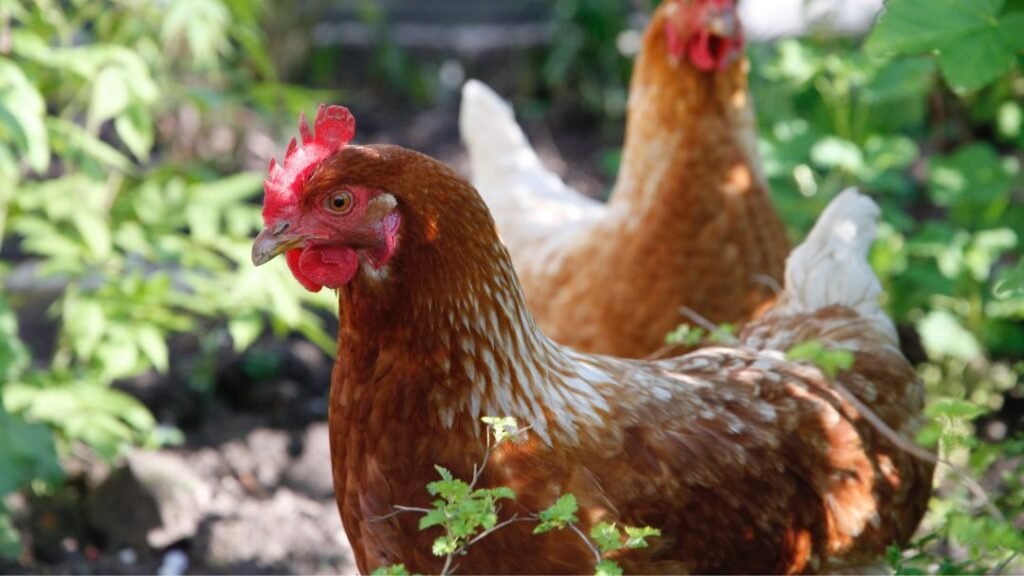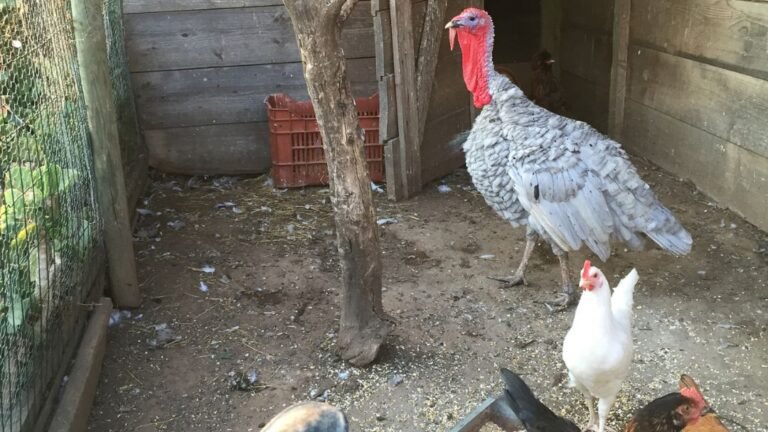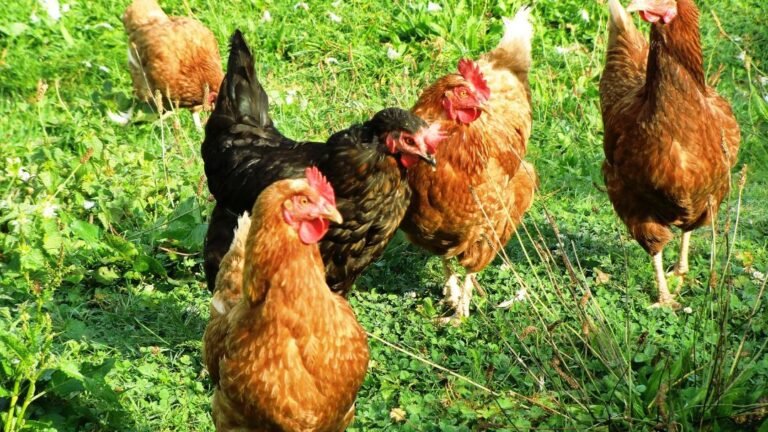To keep chickens out of the garden, install a secure fence around the perimeter. This will prevent chickens from accessing and damaging your garden plants.
Gardening can be a rewarding and fulfilling hobby, but it becomes frustrating when chickens invade your garden space and wreak havoc on your plants. These curious creatures have a knack for scratching and pecking at anything that catches their attention, which can easily destroy all your hard work.
However, there are effective strategies you can employ to keep chickens out of the garden. By implementing a secure fence around the garden’s perimeter, you can create a physical barrier that deters the chickens from entering.
This simple solution will safeguard your plants and allow you to tend to your garden in peace. We will explore different methods to keep chickens at bay and protect your precious garden vegetation.
Understanding The Behavior Of Chickens And The Damage They Can Cause
Chickens can cause significant damage to gardens due to their foraging behavior. Understanding their behavior can help implement effective strategies to keep them out of the garden.
Chickens’ Natural Instincts And Foraging Behavior
Chickens, with their instincts and foraging behavior, can be quite a challenge to keep out of the garden. Understanding how chickens behave and the damage they can cause is vital in implementing effective strategies to protect your garden. Here are some key points to consider:
- Chickens are natural foragers: Chickens have an innate instinct to scratch and peck at the ground in search of food. This foraging behavior helps them find insects, worms, seeds, and vegetation. It’s important to note this instinct when evaluating the potential damage chickens can cause in the garden.
- Scratch marks on soil: When chickens scratch the soil in their search for food, they create distinct scratch marks. These marks can disturb the delicate balance of seedlings, expose the roots of plants, and disrupt the overall structure of the soil. The disarray caused by their scratching can result in damage to the garden beds and hinder plant growth.
- Dust bathing: Chickens also engage in dust bathing, a behavior where they roll and flap around in loose soil or dust. This behavior helps them keep their feathers clean and free from parasites. Unfortunately, their dust bathing activities can obliterate delicate seedlings or damage the foliage of young plants.
- Plant pecking and nibbling: Chickens tend to peck at anything that catches their attention, including young plants and leaves. They may nibble on tender shoots or even uproot small plants in the process. Their pecking can lead to stunted growth or the outright destruction of plants, especially those that are young and vulnerable.
- Fecal matter and soil fertility: Chickens are notorious for their droppings, and when they roam freely in the garden, their waste can become a concern. While chicken manure can be an excellent fertilizer in moderation, excessive amounts can lead to nutrient imbalances and damage delicate plants.
- Movement and trampling: Chickens are continually on the move, exploring their surroundings and establishing their territory. As they explore, they may unintentionally trample on plants or brush against fragile stems, causing damage or even death to the vegetation.
Understanding the behavior of chickens and the potential damage they can inflict on gardens is crucial in finding effective solutions.
By implementing measures to protect your garden, such as creating barriers or designating specific areas for free-ranging, you can strike a balance between keeping your chickens happy and maintaining a thriving garden.
Creating Physical Barriers To Keep Chickens Out
One effective method for keeping chickens out of the garden is to create physical barriers. These barriers will help deter chickens from entering specific areas and protect your plants. Here are some options for creating physical barriers:
- Installing chicken wire fencing around the perimeter: Surrounding your garden with chicken wire fencing can be an effective way to keep chickens out. Ensure that the fence is tall enough (at least 4 feet) and buried at least 6 inches underground to prevent chickens from digging under it. Regularly check for any gaps or holes that may allow chickens to squeeze through or access your garden.
- Constructing raised beds with tall sides: Building raised beds with tall sides can create a natural barrier that chickens find difficult to overcome. The height of the sides should be at least 2 feet to deter chickens from jumping up and accessing the plants. Utilize materials such as wood or metal to construct sturdy raised beds.
- Using netting or bird spikes to protect specific areas: Netting and bird spikes can be useful in protecting specific areas of your garden where chickens are particularly problematic. Netting can be draped over plants or areas you want to protect, preventing chickens from reaching them. Bird spikes can be installed on fences or structures to discourage chickens from roosting or perching.
These physical barriers are effective in preventing chickens from entering your garden and causing damage to your plants. Implementing a combination of these methods based on your garden’s layout and specific needs can provide a strong defense against chickens.
Remember to regularly inspect and maintain these barriers to ensure their effectiveness over time.

Implementing Natural Deterrents To Discourage Chickens
Struggling to keep chickens out of your garden? Learn how to implement natural deterrents effectively and protect your plants from feathered invaders.
Planting Prickly Or Thorny Plants Around The Garden
Create a natural barrier by planting prickly or thorny plants around your garden perimeter. Here are some options to consider:
- Rose bushes: Known for their sharp thorns, rose bushes are beautiful additions to any garden while also providing an effective deterrent for chickens.
- Pyracantha: This evergreen shrub is known for its dense growth and sharp thorns, making it an excellent choice for keeping chickens out of your garden.
- Blackberry or raspberry bushes: Along with producing delicious fruits, these bushes have thorns that can discourage chickens from entering your garden.
- Hawthorn: With its thorny branches, hawthorn creates a dense barrier that can deter chickens from wandering into your garden.
Utilizing Strong-Smelling Herbs And Spices As A Natural Repellent
Chickens are sensitive to strong scents, so incorporating herbs and spices with potent aromas can help keep them away from your garden. Consider the following options:
- Marigolds: Not only do these vibrant flowers add a colorful touch to your garden, but their strong scent can help repel chickens.
- Mint: Known for its powerful aroma, mint plants can act as a natural deterrent for chickens. Plant them around the perimeter of your garden or in pots strategically placed.
- Lavender: Chickens are not fans of lavender’s fragrance, making it an effective repellent. Plant lavender near the entrance of your garden to discourage chickens from entering.
- Garlic: The strong odor of garlic can be off-putting to chickens. Plant garlic bulbs around your garden or sprinkle crushed garlic cloves in strategic areas.
- Thyme: Chickens tend to dislike the scent of thyme. Plant this herb near their favorite entry points to discourage them from entering your garden.
Applying Vinegar Or Citrus Solutions To Deter Chickens
The strong smell of vinegar and citrus can act as natural repellents for chickens. Here’s how you can use these solutions to deter them:
- Vinegar solution: Mix equal parts of white vinegar and water in a spray bottle. Spray the solution around the areas where chickens frequently enter your garden. The scent of vinegar will deter them from coming back.
- Citrus solution: Squeeze the juice of citrus fruits like oranges or lemons into a spray bottle filled with water. Spray this solution around the edges of your garden or on plants that chickens tend to target. The strong citrus scent will discourage them from approaching.
By implementing natural deterrents like prickly or thorny plants, strong-smelling herbs and spices, and vinegar or citrus solutions, you can effectively keep chickens out of your garden. These methods are humane, and eco-friendly, and can help protect your plants from unwanted pecking and scratching.
Incorporating Visual And Auditory Deterrents
One effective way to keep chickens out of the garden is by incorporating visual and auditory deterrents. These deterrents can include hanging shiny objects or wind chimes to create visual disturbances and noise that will dissuade the chickens from venturing into the garden.
Hanging Reflective Objects To Startle And Discourage Chickens:
- Hanging reflective objects, such as old CDs or aluminum foil strips, can be an effective visual deterrent against chickens entering your garden.
- These shiny objects catch the sunlight and create flashes of light, startling the chickens and making them hesitant to approach.
- Hang these objects at various heights and angles around your garden to maximize their effectiveness.
- The movement and unpredictable reflections will make the chickens uncomfortable and encourage them to stay away.
Playing Predator Calls Or Distress Sounds To Create An Intimidating Atmosphere:
- Utilizing predator calls or distress sounds through audio devices can help create an intimidating atmosphere for chickens in your garden.
- These sounds mimic the presence of predators, instinctively triggering fear and caution among the chickens.
- Choose sounds that are specific to the predators in your area, such as hawks, foxes, or dogs, as this will have a greater impact.
- Remember to periodically change the sounds to prevent the chickens from becoming familiar with them.
- Additionally, consider timing the playback during periods when chickens are most active, like early mornings or late afternoons.
Using Motion-Activated Sprinklers Or Scarecrows To Mimic Threats:
- Motion-activated sprinklers and scarecrows are effective tools for mimicking threats and deterring chickens from your garden.
- When chickens approach, the sudden burst of water from the sprinklers startles them, making them associate the garden with an unpleasant experience.
- Place the sprinklers strategically to cover the areas most frequented by the chickens.
- Scarecrows can also be used to create the illusion of a predator presence, scaring away the chickens.
- Make sure to occasionally move and adjust the scarecrows to maintain their effectiveness.
Utilizing Companion Planting Techniques
Utilize companion planting techniques to keep chickens out of the garden. Implementing strategic plant combinations helps deter chickens from damaging crops.
Pairing Crops With Plants That Chickens Dislike:
- Marigolds: Chickens dislike the strong scent of marigolds, making them an excellent choice for planting around your garden. Their vibrant colors also add beauty to the landscape.
- Nasturtiums: These flowers release a pungent odor that chickens find unpleasant, deterring them from the area. Plus, nasturtiums attract beneficial insects like ladybugs, which can help control pests.
- Garlic: Chickens have a natural aversion to the smell of garlic. Planting it near your crops can keep them at bay while also providing you with a delicious culinary herb.
- Mint: Mint’s strong aroma is disliked by chickens, making it an effective plant for deterring them from the garden. Be sure to contain mint in pots or a dedicated area, as it can spread aggressively.
Introducing Beneficial Insects And Animals That Prey On Chickens:
- Predator decoys: Installing fake predators like plastic owls or hawk balloons in your garden can help scare away chickens. Their presence signals danger to the chickens, making them think twice before entering the area.
- Ducks: Ducks are natural predators of chickens and can help keep them out of your garden. Consider adding a few ducks to your poultry flock or allow them to roam freely around the garden.
- Guineafowl: These birds are known for their ability to control insect populations, including the ones that attract chickens. Guinea fowl can serve as a helpful ally in keeping chickens away from your precious plants.
Creating A Diverse And Balanced Ecosystem In Your Garden:
- Plant diversity: Growing a variety of plants in your garden can help create a balanced ecosystem. This diversity provides alternative food sources for chickens, making them less likely to focus on your prized crops.
- Mulching: Applying a layer of organic mulch around your plants can make it difficult for chickens to scratch and dig. This protective barrier can discourage them from accessing your garden.
- Plant barriers: Erecting physical barriers, such as fences or netting, can prevent chickens from entering your garden area. Ensure that the barriers are sturdy and tall enough to prevent them from flying or jumping over.
- Providing alternative foraging areas: Give your chickens a designated space where they can scratch, forage, and enjoy themselves. This can divert their attention from your garden and encourage them to stay in their designated area.
Implementing Effective Feeding And Watering Strategies
Implementing effective feeding and watering strategies is crucial to keep chickens out of the garden. By providing designated feeding areas and keeping water sources away from garden beds, you can minimize their interference and protect your plants.
Ensuring Chickens Have Access To A Separate Feeding Area And Abundant Water Source
Providing chickens with a separate feeding area and abundant water source is essential for keeping them away from your precious garden. Here are some strategies you can implement:
- Designate a designated feeding area: Create a designated feeding area away from your garden to minimize the chickens’ access to it. This can be a specific spot in their coop or a separate feeding station outside. Placing the feeding area away from the garden will discourage them from venturing into it in search of food.
- Install protective covers on feeders and waterers: Use chicken feeders and waterers with protective covers to prevent the chickens from pecking at the plants while they eat. These covers will also keep pests and rodents away, ensuring that the food is safe and the water remains clean.
- Implement timed feeding schedules: Establishing timed feeding schedules can help discourage chickens from foraging in your garden. By providing them with an ample amount of food at specific times, they will be less inclined to search for food elsewhere. Be consistent with the feeding schedule to train them to rely on the designated feeding area.
- Ensure abundant water supply: Chickens require a constant supply of clean water. Make sure the water source is easily accessible to them, preferably in the designated feeding area. Providing enough water will keep them hydrated and dissuade them from seeking water elsewhere.
Implementing these strategies will help keep your chickens well-fed and hydrated while minimizing their impact on your garden. With a separate feeding area and abundant water source, your chickens will be less likely to venture into your beloved green space.
Properly Maintaining And Monitoring Your Garden
Maintaining and monitoring your garden is essential to keep chickens out and protect your precious plants. By regularly inspecting and repairing any potential entry points or damage to barriers, removing fallen fruits or vegetables promptly, and implementing regular garden hygiene practices, you can minimize chicken activity and create a harmonious garden environment.
Follow these guidelines to ensure your garden stays chicken-free:
- Regularly inspecting and repairing any potential entry points or damage to barriers:
- Check for holes or gaps in fences or netting and promptly repair them to prevent chickens from entering.
- Ensure that gates are closed securely to avoid any accidental entry by chickens.
- Inspect raised beds or garden borders for any damage, and reinforce them if needed.
- Removing any fallen fruits or vegetables promptly to reduce chicken attraction:
- Fallen fruits or vegetables can attract chickens to your garden, so it’s crucial to remove them promptly.
- Check your garden regularly and collect fallen produce, disposing of it properly.
- Implementing regular garden hygiene practices to minimize chicken activity:
- Keep your garden tidy and free from debris or clutter that might attract chickens.
- Clear away any brush piles or compost heaps that could provide hiding spots for chickens.
- Avoid leaving open containers or buckets filled with water, as chickens are attracted to water sources.
By following these steps, you can maintain a chicken-free garden and protect your plants from potential damage. Regular inspections, quick repairs, and a clean garden environment will help keep your garden thriving while keeping chickens at a safe distance.
Engaging In Habitat Modification
Engage in habitat modification to keep chickens out of your garden. Implement barriers such as fences or netting, create designated feeding areas, and provide alternate habitats to prevent damage to your plants and vegetables.
Keeping garden areas clean and free of debris that may attract chickens:
- Clear away fallen fruits, vegetables, and plant debris regularly to avoid attracting chickens to the garden area.
- Remove any food scraps or spilled birdseed that may tempt chickens to explore the garden.
- Keep compost piles securely covered or fenced off to prevent chickens from scratching and damaging plants.
Creating designated dust bathing areas to discourage chickens from damaging plant roots:
- Provide chickens with a separate dust bathing area away from the garden to satisfy their instinct.
- Designate a sunny, dry spot where chickens can dig and fluff up the soil without disturbing plant roots.
- Add a mixture of sand, dirt, and wood ash to the dust bathing area as it helps control mites and lice on the chickens’ feathers.
Employing deterrents such as decoy predators or reflective tape near the garden:
- Place realistic-looking decoy predators, like owls or snakes, strategically around the garden to intimidate and deter chickens.
- Hang reflective tape or strips of aluminum foil near the garden to create movement and scare off chickens.
- Regularly move and change the location of deterrents to prevent chickens from becoming familiar with them.
Remember, habitat modification plays a crucial role in keeping chickens out of the garden. By keeping the garden clean, creating designated areas for their natural habits, and employing deterrents, you can effectively prevent chickens from damaging your precious plants and enjoy a thriving garden.
Seeking Community Support And Cooperation
Looking for ways to protect your garden from chickens? Seek support and cooperation from your community to keep these feathered friends out.
Sharing Experiences And Advice With Fellow Gardeners To Combat Chicken Issues:
- Connect with other gardeners in your community who have experienced similar challenges with chickens in the garden.
- Share your experiences and seek advice on how to effectively keep chickens out of your garden.
- Discuss strategies, techniques, and products that have proven successful in deterring chickens.
- Consider joining online forums, social media groups, or local gardening clubs to connect with fellow gardeners and learn from their experiences.
- By sharing knowledge and insights, you can collectively find solutions that work best for your specific situation.
Collaborating With Neighbors To Deter Chickens Collectively:
- Talk to your neighbors about the chicken issues you are facing in your garden.
- Explain the negative impact chickens can have on crops and landscaping.
- Propose a collaborative approach to address the problem collectively.
- Encourage your neighbors to implement chicken deterrent measures in their own yards.
- By working together, you can create a stronger barrier against chickens and minimize the overall impact on gardens in the community.
- Sharing resources, ideas, and responsibilities can make the deterrent efforts more effective and sustainable for everyone involved.
Considering Local Regulations Or Ordinances Regarding Chicken Ownership:
- Familiarize yourself with local regulations or ordinances related to keeping chickens.
- Check if there are any restrictions on chicken ownership or specific guidelines on maintaining them within residential areas.
- Ensure that you and your neighbors are compliant with these regulations.
- If there are no existing regulations, consider discussing the possibility of implementing guidelines with local authorities or homeowner’s associations.
- Adhering to local rules not only ensures a harmonious relationship with neighbors but also contributes to the overall order and well-being of the community.
Conclusion
To summarize, keeping chickens out of the garden requires a combination of proactive measures, such as creating physical barriers and providing alternative areas for them to roam. Installing sturdy fences and gates can deter chickens from accessing your prized plants.
Utilizing chicken wire or netting around vulnerable areas can provide an additional layer of protection. Designating a separate space for the chickens to freely explore can help redirect their instincts away from your garden. Additionally, employing visual deterrents, like scarecrows or reflective surfaces, can discourage chickens from venturing into your garden.
Regularly monitoring and maintaining these preventive measures will ensure a chicken-free garden and allow your plants to flourish undisturbed. By implementing these strategies, you can strike a balance between maintaining a healthy garden and allowing your chickens to enjoy their surroundings without causing any damage.





